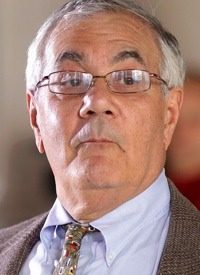
A political insider told the Boston Globe that “the new district in which Frank would have had to run next year was a major factor in his decision. While it retained his Newton stronghold, it was revised to encompass more conservative towns while Frank also lost New Bedford, a blue-collar city where he had invested a lot of time and become a leading figure in the region’s fisheries debate.”
Frank complained that the political arena had changed “in a way that makes it harder to get anything done at the federal level.” He reflected that as a legislator he had been effective at “working inside the process to influence public policy in the ways that I think are important. But I now believe that there is more to be done trying to change things from outside than by working within.”
In a subsequent news conference Frank expressed his disappointment that the liberal “leverage” he had enjoyed for years in government had been diminished. “The anger in the country, the currents of opinion are such that the kind of inside work I have felt best at is not going to be as productive for the foreseeable future, and not until we make some changes,” he said, alluding to the loss of the Democrat majority in the House, and of his own chairmanship of the powerful House Financial Services Committee.
Instead of campaigning for reelection, Frank said that he would spend the remainder of his term protecting his Dodd-Frank “financial reform” law from “right-wing assaults,” as well as concentrating on making a “substantial reduction in our excessive overseas military commitments” a major part of the nation’s long-term deficit reduction.
The 71-year-old Frank won his seat in liberal Massachusetts in 1980, and was the first Congressman to admit that he is homosexual. His lifestyle caught up with him in the late 1980s when it was discovered, recalled National Review Online, that he was involved with “a gay hustler and convicted drug dealer whom the congressman was paying for sex, and who ended up running a prostitution operation out of the congressman’s home.” Frank received a reprimand from his House colleagues, noted National Review, “for making misleading statements to a Virginia prosecutor on behalf of the prostitute — whom the congressman eventually put on his own payroll — and for having fixed dozens of parking tickets on his behalf.”
Frank’s constituents turned a blind eye to their Representative’s seamy behavior, and over the years he became a dependable Democratic stalwart for a liberal agenda. “This country has never had a Congressman like Barney Frank, and the House of Representatives will not be the same without him,” President Obama rightly observed, noting the Massachusetts’ lawmaker’s efforts on behalf of an aggressive homosexual agenda, as well as his leadership in passing “financial reform,” the legislation for which he will be most remembered.
National Review noted that history will actually document two pieces of financial chicanery in which Frank was intimately involved. The first was the bailout of Fannie Mae and Freddie Mac, the government-subsidized housing lenders that were part and parcel of the national mortgage debacle that fueled a subsequent financial crisis. Frank spent an inordinate effort defending the lenders, “even after the government uncovered ‘extensive’ fraud at Fannie Mae and found that Freddie Mac had illegally channeled funds to its political benefactors,” recalled National Review.
In a Fox News editorial, Karl Rove recalled that in 2003 Frank “called Fannie and Freddie ‘fundamentally sound financially’ and accused the Bush Administration of trying to ‘exaggerate a threat of safety … [to] conjure up the possibility of serious financial losses to the Treasury, which I do not see.’” Four years later, he continued, “as Chairman of the House Financial Services Committee and just as Fannie and Freddie — overleveraged and stuffed to the gills with risky mortgages they’d encouraged and facilitated — were about to go over the cliff, Mr. Frank attacked President George W. Bush’s call for reform as ‘inane.’” Finally, noted Rove, “when Fannie and Freddie went belly up in the fall of 2008, Mr. Frank voted for the same Bush Administration reforms that could have averted the bankruptcies of Fannie and Freddie.”
Interestingly, Frank’s homosexuality figured into the affair, when it was found that he “was sexually involved with a Fannie Mae executive during a time when he was voting on laws affecting the organization,” reported National Review. “The final cost of the Fannie/Freddie bailouts will run into the hundreds of billions of dollars, and the real damage that the organizations did to the U.S. economy — and the world economy, for that matter — probably is incalculable.”
Barely two years later, in response to the financial crisis in which he played at least a supporting role, Frank went on to help craft the “financial reform” bill that bears his name. What began as a punitive measure, recalled National Review, “evolved into a dispensary of political favors, and in the end did little or nothing to address the problems that led to the 2008–09 crisis or to prevent similar crises in the future.”
Concluded the National Review editors of the retiring Congressman’s career: “Representative Frank personifies a great deal of what is wrong with American public life. Though a highly intelligent man, he made the wrong decisions at every turn, and compounded his policy errors with the petty and vindictive style of his politics. Republicans will not miss him. Neither should his Democratic colleagues, his constituents, or the American public that will be paying off the cost of his errors and those of his allies, with interest, for a great many years.”
Political analysts noted that Frank is the 17th Democratic incumbent Congressman to bow out of the 2012 race, compared to only six retiring Republicans — making it ever more likely that the GOP will retain control of the House. Among the possible Democratic contenders for Frank’s seat, according to the New York Times, is Joseph P. Kennedy III, grandson of Robert F. Kennedy, who has shown interest in continuing the Kennedy political legacy.
Photo of Barney Frank: AP Images



